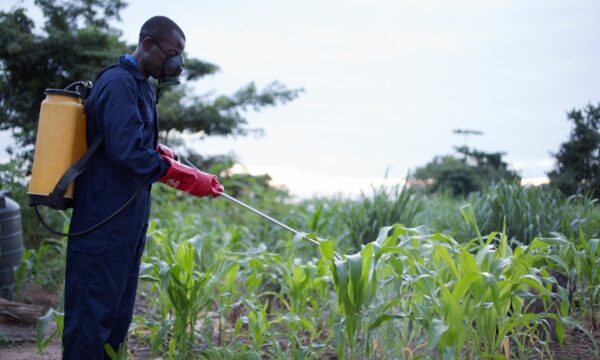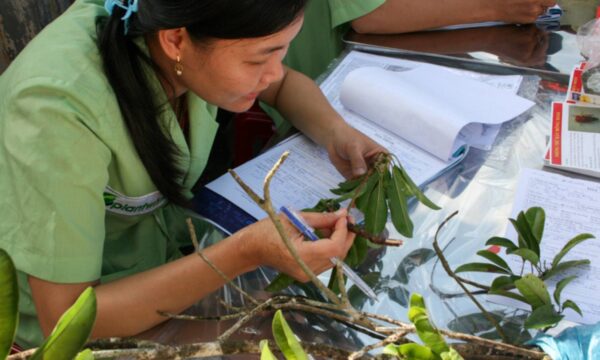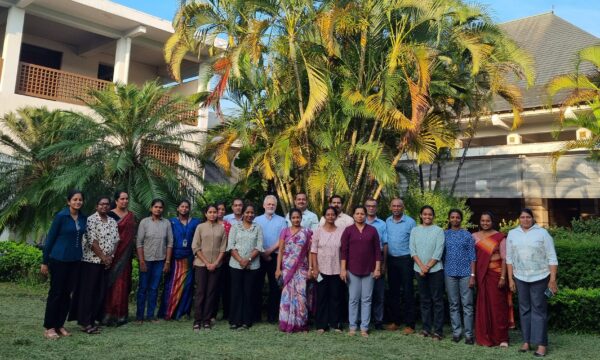In Nepal, digital tools are strengthening agricultural advisory services by providing timely information, facilitating remote training, and promoting the dissemination of best practices and innovations efficiently and widely. PlantwisePlus has been developing and updating various digital tools to support agricultural extension workers, private-sector farm advisory service providers, plant protection officers, farmers, researchers, and students.
Digital tool student workshop
Recently, the Agriculture and Forestry University (AFU) in Rampur Chitwan, Nepal, hosted an orientation session to discuss how CABI PlantwisePlus digital decision support tools can benefit plant health monitoring and management. The event, which took place in early May, aimed to enhance the knowledge and application of the tools among postgraduate students and faculty members, ensuring they are well-equipped to utilize CABI digital resources in their agricultural practices, research, and farmer advisory roles.

The session saw an enthusiastic 101 participants, comprising 53 female students and 48 male students and faculty members. The high level of participation reflected the university community’s keen interest and commitment to staying abreast of the latest agricultural innovations. Event attendees included Dr Arjun Kumar Shrestha, Dean, Faculty of Agriculture, AFU, Rampur, Dr Vinod Pandit, Regional Director, South Asia, CABI, Dr Debraj Adhikari and Mr Madhav Bhatta from Plant Quarantine and Pesticide Management Center (PQPMC).
PlantwisePlus tools and their benefits
Dr Mahesh H M, Crop Health Advisor and CABI Country Coordinator for Nepal, gave an in-depth overview of the CABI decision support tools, including CABI Academy, CABI Bioprotection Portal, PlantwisePlus Knowledge Bank, Crop Sprayer App, PlantwisePlus Factsheets App, and Crop App Index, all developed under the PlantwisePlus programme. CABI designed the tools to assist in diagnosing plant health problems, offering practical solutions and advice to manage pests and diseases effectively. The session emphasized how digital resources can transform traditional farming methods and help improve crop yields and the use of sustainable agricultural practices.
Notably, faculty members and students were already familiar with PlantwisePlus and its Plant Clinic approach in Nepal, a testament to the programme’s proactive approach to integrating modern agricultural tools. The orientation highlighted how the digital decision support tools complement PlantwisePlus Plant Clinics, providing a seamless flow of information and support to the farming community.
Sharing experiences
During the session, two students who completed the Crop Pest Diagnosis Course (CPD) shared their positive experiences. Their testimonies underscored the practical benefits and positive impact of the PlantwisePlus tools in real-world scenarios, motivating their peers to actively engage with the resources.
The postgraduate students from the Department of Economics and Agriculture Extension questioned how agricultural decision support tools can benefit students other than those studying Entomology and Plant Pathology. Dr Vinod Pandit led the interactive discussion, motivating other students to answer the query. There was a consensus that CABI’s decision support tools can help smallholder farmers lose less of the crops they produce. Moreover, the students agreed that every agricultural student’s responsibility, irrespective of their discipline, is to support farmers’ needs.
The detailed discussions ensured that every participant understood the wide array of benefits these tools offer, from improving diagnostic accuracy to providing tailored management recommendations. As such, the PlantwisePlus digital tools are poised to be game changers in agricultural education and practice.
Second student workshop
Rampur Campus, Khairahani, Chitwan, hosted a similar interactive session under the Institute of Agriculture and Animal Science, Tribhuvan University, Nepal. Forty-eight equally enthusiastic participants, comprising 27 female and 21 male students and faculty members, attended the session on the 2nd of May afternoon.

Commitment to future use
The orientation sessions concluded with a collective promise from all the students and faculty members to integrate and utilize the PlantwisePlus digital decision support tools in their academic and field activities. This commitment signifies a promising step towards advancing agricultural knowledge and practices at the agriculture campuses, ultimately contributing to the broader goal of sustainable and efficient farming in Nepal. The success of this orientation session marks the beginning of a more informed and technology-driven approach to agriculture among the next generation of agriculture experts.
PlantwisePlus
PlantwisePlus gratefully acknowledges the financial support of the Directorate-General for International Cooperation (DGIS), Netherlands; European Commission Directorate General for International Partnerships (INTPA, EU); the Foreign, Commonwealth & Development Office (FCDO), United Kingdom; and the Swiss Agency for Development and Cooperation (SDC).
Related News & Blogs
How do pest risk registers address the spread of plant pests in Africa?
Pest risk registers can help to solve problems in agriculture, addressing the growing global threat of plant pests. Moreover, changing weather patterns, led by rising temperatures, are causing them to reproduce faster and expand into new regions. In ad…
10 July 2025




